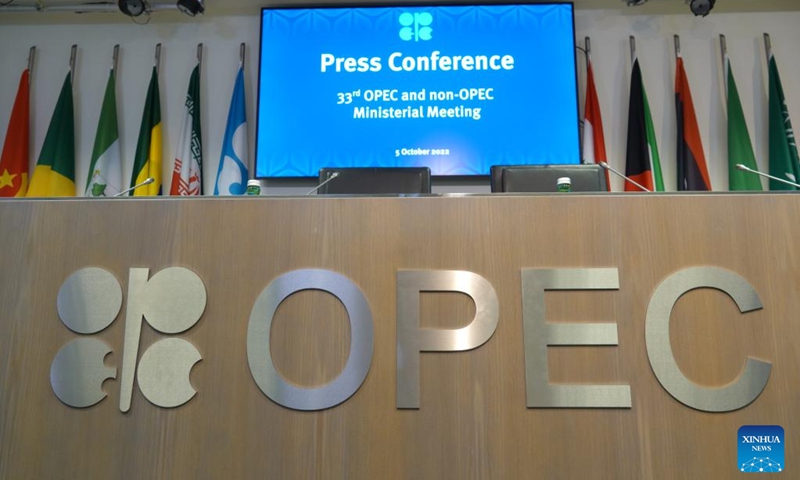OPEC+ to cut oil output despite US opposition, showing 'widening discrepancies with Washington'

Photo taken on Oct. 5, 2022 shows the press center at the headquarters of the Organization of the Petroleum Exporting Countries (OPEC) in Vienna, Austria. The Organization of the Petroleum Exporting Countries (OPEC) and its allies, a group known as OPEC+, on Wednesday announced a major production cut of 2 million barrels per day (bpd) starting November to bolster oil prices that have recently tumbled over recession fears.(Photo: Xinhua)
The Organisation of the Petroleum Exporting Countries (OPEC) and its allies agreed to a bigger than expected cut in oil production despite US opposition. Experts say that the move shows widening cracks between OPEC members and the US as some past US allies are no longer willing to cooperate with US strategies.
Such decision will further add to political pressure faced by the Biden administration ahead of the upcoming midterm elections, which is already facing domestic criticism for ineffective measures against inflation. It will also worsen the economic situation in Europe by driving up energy prices, experts noted.
The OPEC and its allies on Wednesday decided to cut oil output by 2 million barrels of oil a day, equal to 2 percent of the global oil supply, a move which Saudi Arabia, the de-facto OPEC leader, said was necessary to respond to rising interest rates in the West and a weaker global economy, according to a recent Reuters report.
The decision has instantly sent oil prices up. As of press time, the Brent Crude Oil has risen by 0.06 percent to $93.43 per barrel, from the $85.14 of September 30.
OPEC's decision triggered protests from the Biden administration. The White House said in a statement that Biden is "disappointed" by the "shortsighted decision by OPEC+ to cut production quotas", the Reuters noted.
The statement also said that Biden will continue to assess whether to release further strategic oil stocks to lower prices.
This incident is another reflection of the widening cracks between OPEC members and the US, which used to be allies, as the world's major oil producers are growing increasingly impatient with the US' self-centered global strategies, analysts said.
A report of ABC News announced that the OPEC and its allies' decision is a "slap in the face" for Biden who visited Saudi Arabia earlier this year. The Biden administration had hoped to secure a promise from Saudi Arabia to increase oil output, but failed.
Experts said that oil producers like Saudi Arabia are no longer willing to sacrifice their own interests to coordinate with US' strategies, like cracking down upon Russia
"The US is shifting its strategic focus from the Middle East to the Asia Pacific region. Against such a backdrop, Middle East countries can no longer rely on the US for geopolitical protection as much as before, thus they have no incentive to follow the US orders unconditionally," Hu Qimu, deputy secretary general of digital-real economies integration forum 50, told the Global Times on Thursday.
In particular, if the OPEC oil cartel assists the US in suppressing oil prices, it would bring negative impact to their own economy for generating less oil income. The OPEC does not want to "pay the bill" for US strategies, analysts noted.
Global oil prices have been on a declining trend since mid-2022 and the US Federal Reserve's interest rate hikes are also an important reason behind it, Hu noted.
"The US' policies are becoming increasingly self-centered, in that they are building economic development upon the foundation of other countries' decline, such as a global capital outflow to the US. Now that they don't take oil producers' interests into account, the latter are also growing tired of pandering to the US, " he noted.
On the other hand, many countries' obedience to the US had also been built around the dominance of US national power in the past, but at a time when the world order is being shaken and the US' strength is receding with economic problems like inflation and technical recession, it's natural that other countries are not willing to blindly follow the US' footsteps, experts said.
Additionally, experts also noted that the OPEC's decision to cut oil production will further drive up oil prices and add pressure to the Biden administration ahead of the midterm election, as they are already facing criticism from domestic voters about inefficiency in combating the ongoing commodity price rise.
The oil price increase will likely produce further shock waves in EU's economy, which is already facing problems like inflation and currency depreciation.




